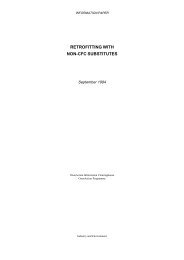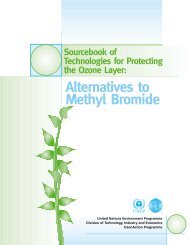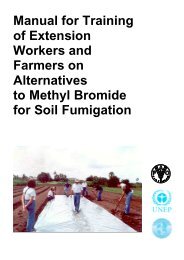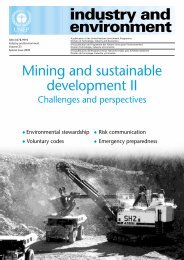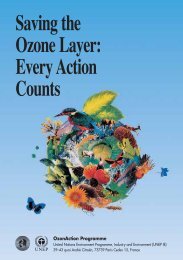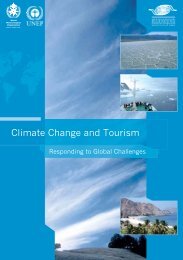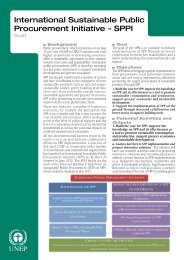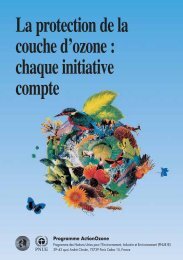industry and environment - DTIE
industry and environment - DTIE
industry and environment - DTIE
You also want an ePaper? Increase the reach of your titles
YUMPU automatically turns print PDFs into web optimized ePapers that Google loves.
N e w s<br />
ments concerned with finance <strong>and</strong> sustainability.<br />
(2004). UNEP FI (Finance Initiative), International<br />
Environment House, 15 chemin des Anémones,<br />
CH-1219 Châtelaine, Geneva, Switzerl<strong>and</strong>,<br />
Tel: +41 22 917 8178; Fax: +41 22 796 9240, E-<br />
mail: fi@unep.ch; Internet: www.unepfi.net. Values<br />
to Value can be ordered from Earthprint Ltd., PO<br />
Box 119, Stevenage SG1 4TP, UK, Tel.: +44 1438<br />
748 111; Fax: +44 1438 748 844; E-mail:<br />
orders@earthprint.com; Internet: www.earthprint.com.<br />
Ring binder.<br />
Energy<br />
Financial Risk Management<br />
Instruments for Renewable<br />
Energy Projects: Summary<br />
Document<br />
Traditional insurance products are gradually becoming<br />
more widely available to the renewable<br />
energy (RE) sector. However, “institutional inertia”<br />
has impeded progress<br />
in developing new risk<br />
management <strong>and</strong> financing<br />
products. The costs<br />
of financing RE projects<br />
could be reduced by<br />
transferring certain types<br />
of risks away from investors<br />
<strong>and</strong> lenders using<br />
risk management instruments<br />
such as contracts, insurance <strong>and</strong> reinsurance,<br />
alternative risk transfer instruments <strong>and</strong><br />
credit enhancement products. This report was<br />
funded by UNEP’s Sustainable Energy Finance<br />
Initiative (SEFI) (www.sefi.unep. org). The entire<br />
report can be downloaded at www.untptie.<br />
org/energy/qct/fin/index.htm.<br />
(2004). UNEP <strong>DTIE</strong>, Tour Mirabeau, 39-43<br />
quai André-Citroën, 75739 Paris Cedex 15, France,<br />
Tel: +33 1 44 37 14 50; Fax: +33 1 44 37 14 47; E-<br />
mail: unep.tie@unep.org; Internet: uneptie.org. This<br />
publication can be ordered from Earthprint Ltd., PO<br />
Box 119, Stevenage SG1 4TP, UK, Tel.: +44 1438<br />
748 111; Fax: +44 1438 748 844; E-mail:<br />
orders@earthprint.com; Internet: www.earthprint.<br />
com. Pbk., 47p. ISBN 92-807-2445-2.<br />
Energy Subsidies: Lessons<br />
Learned in Assessing their<br />
Impact <strong>and</strong> Designing Policy<br />
Reforms<br />
The country case studies collected <strong>and</strong> analyzed in<br />
this report demonstrate the complexity of the use<br />
of subsidies. Those that encourage production <strong>and</strong><br />
use of fossil fuels <strong>and</strong> other non-renewable forms<br />
of energy are generally – but not always – <strong>environment</strong>ally<br />
harmful. Some types of renewables can<br />
have negative <strong>environment</strong>al consequences (e.g.<br />
disturbance of regional ecosystems when dams are<br />
constructed). Governments should give priority to<br />
eliminating subsidies that are both economically<br />
costly <strong>and</strong> <strong>environment</strong>ally harmful.<br />
(2003). UNEP <strong>DTIE</strong>/ETB (Economics <strong>and</strong><br />
Trade Branch), 11-13 chemin des Anémones, CH-<br />
1219 Geneva, Switzerl<strong>and</strong>, Tel: +41 22 917 82 43;<br />
Fax: +41 22 917 80 76; Internet: www.unep.ch/etu.<br />
This publication can be ordered from Earthprint<br />
Ltd., PO Box 119, Stevenage SG1 4TP, UK, Tel.:<br />
+44 1438 748 111; Fax: +44 1438 748 844; E-<br />
mail: orders@earthprint.com; Internet: www.earthprint.com.<br />
Pbk., 174p. ISBN 92-807-2277-8.<br />
(Also available in hardback.)<br />
Climate<br />
Industry Genius: Inventions <strong>and</strong><br />
People Protecting the Climate <strong>and</strong><br />
Fragile Ozone Layer<br />
Industry Genius tells the story of eight companies<br />
<strong>and</strong> two government enterprises whose “inventive<br />
genius” is being used to protect the climate <strong>and</strong><br />
ozone layer. Sometimes the products of this genius<br />
are almost accidental. More often, they result<br />
from recognition by management <strong>and</strong> leadership<br />
that consumers want green products <strong>and</strong> that citizens<br />
want <strong>environment</strong>al quality. The Preface was<br />
contributed by former astronaut Richard Truly,<br />
Director of the US Department of Energy’s<br />
National Renewable Energy Laboratory; Jacqueline<br />
Aloisi de Larderel, UNEP <strong>DTIE</strong>’s Executive<br />
Director from 1987 to 2003, wrote the Foreword.<br />
Stephen O. Andersen <strong>and</strong> Durwood Zaelke<br />
(2003). Greenleaf Publishing Ltd., Aizlewood Business<br />
Centre, Aizlewood’s Mill, Nursery Street,<br />
Sheffield S3 8GG, UK, Tel: +44 114 282 4375,<br />
Fax: +44 114 282 3476, E-mail: info@greenleafpublishing.com,<br />
Internet: www.greenleaf-publishing.com.<br />
Pbk., 192p. ISBN 1-874719-68-3.<br />
Water<br />
Guidelines on Municipal<br />
Wastewater Management<br />
This is Version 3 of a set of practical guidelines for<br />
decision-makers <strong>and</strong> professionals on how to plan,<br />
design <strong>and</strong> finance appropriate <strong>and</strong> <strong>environment</strong>ally<br />
sound municipal wastewater discharge systems.<br />
They emphasize the need to link water<br />
supply <strong>and</strong> the provision of household sanitation,<br />
wastewater collection, treatment <strong>and</strong> reuse, cost<br />
recovery <strong>and</strong> reallocation to the natural <strong>environment</strong>.<br />
The Global Programme of Action for the<br />
Protection of the Marine Environment from<br />
L<strong>and</strong>-Based Activities (GPA) developed the<br />
guidelines with WHO, UN-Habitat <strong>and</strong> the<br />
Water Supply <strong>and</strong> Sanitation Collaborative<br />
Council (WSSCC). This document can be<br />
downloaded at www.gpa.unep.org. Its contents<br />
are shared with the Sanitation Connection Database<br />
(www.sanicon.net).<br />
(2004). UNEP/GPA Co-ordination Office, PO<br />
Box 16227, 2500 BE The Hague, the Netherl<strong>and</strong>s,<br />
Tel: +31 (70) 311 4460; Fax: +31 (70) 345 6648;<br />
E-mail: gpa@unep.nl; Internet: www.gpa.unep.org.<br />
Pbk., 92p.<br />
Improving Municipal<br />
Wastewater Management in<br />
Coastal Cities<br />
This is the first version of a training manual for<br />
municipal water managers. It was developed with<br />
the UNESCO-IHE Institute for Water Education<br />
<strong>and</strong> the UN/DOALAS Train-Sea-Coast Programme.<br />
The content is based on the UNEP/<br />
WHO/HABITAT/WSSCC guidelines on municipal<br />
wastewater management (above). GPA is the<br />
only global action programme that specifically<br />
addresses the interface between the freshwater <strong>and</strong><br />
coastal <strong>environment</strong>s. This training manual can be<br />
downloaded at www.gpa.unep.org.<br />
(2004) Train-Sea-Coast GPA, c/o UNEP/GPA<br />
Coordination Office, PO Box 16227, 2500 BE The<br />
Hague, the Netherl<strong>and</strong>s, Tel: +31 (70) 311 4460;<br />
Fax: +31 (70) 345 6648; E-mail: tsc-gpa@unep.nl;<br />
Internet: www.gpa.unep.org/training. Pbk., 118p.<br />
National/regional<br />
Desk Study<br />
on the<br />
Environment<br />
in Iraq<br />
Desk Study<br />
on the<br />
Environment<br />
in Liberia<br />
These two post-conflict “Desk Studies” follow<br />
similar UNEP reports on the Balkans, the Occupied<br />
Palestinian Territories <strong>and</strong> Afghanistan.<br />
Between the initiation of the Iraq study in February<br />
2003 <strong>and</strong> its publication, it was not possible<br />
to work in the field, make <strong>environment</strong>al measurements<br />
or contact Iraqui scientists <strong>and</strong> scientific<br />
institutions. The report therefore presents an<br />
overview of chronic <strong>and</strong> war-related <strong>environment</strong>al<br />
issues. Easing the humanitarian situation<br />
should have the highest priority (e.g. through<br />
restoration of water, power <strong>and</strong> sanitation networks<br />
<strong>and</strong> ensuring food security). Cleaning up<br />
pollution hot spots <strong>and</strong> dealing with other sources<br />
of pollution are also critical. This Desk Study<br />
emphasizes that <strong>environment</strong> should be integrated<br />
into reconstruction <strong>and</strong> development projects.<br />
In Liberia, as in many other countries, an abundance<br />
of resources has provoked war <strong>and</strong> much<br />
suffering (a peace agreement was signed in 2003).<br />
Liberians have paid a high price for living in a<br />
country that is rich in natural resources The most<br />
urgent <strong>environment</strong>al concerns identified in this<br />
Desk Study are: increasing access to safe drinking<br />
water <strong>and</strong> sanitation; restoring household <strong>and</strong><br />
commercial solid waste collection; protecting timber<br />
resources; <strong>and</strong> strengthening the country’s<br />
<strong>environment</strong>al management capacity.<br />
(2003, Iraq; 2004, Liberia). UNEP, PO Box<br />
84 ◆ UNEP Industry <strong>and</strong> Environment April – September 2004



